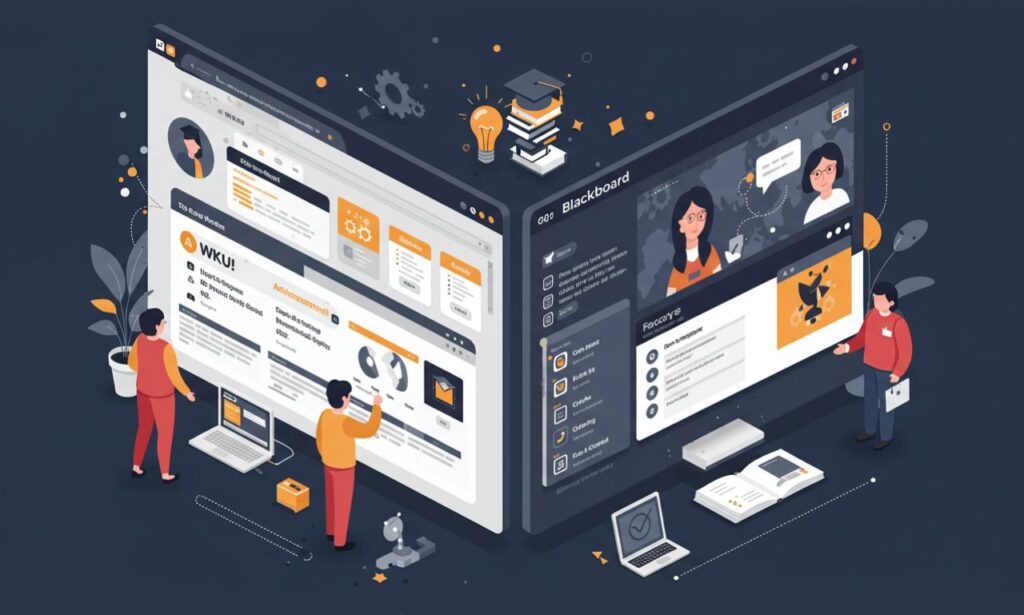Western Kentucky University, often called WKU, has long been a pioneer in offering accessible and flexible education. As classrooms increasingly shift toward digital learning environments, the university has made significant investments in tools that empower both students and instructors. Among these tools, WKU Blackboard stands out as the backbone of online learning.
At its core, WKU Blackboard functions as a Learning Management System (LMS). This digital hub allows students to attend classes virtually, review lecture notes, submit assignments, check grades, and collaborate with peers. Faculty, on the other hand, use the system to organize course content, evaluate performance, and stay connected with students outside of physical classrooms.
With its recent upgrade to Ultra Course View, the platform has become even more intuitive, streamlined, and user-friendly. This article dives deep into the many facets of WKU Blackboard—how to access it, what features it provides, the benefits of using it, and why it is shaping the future of education at WKU.
WKU Blackboard: Accessing the Platform
Accessing WKU Blackboard is simple and convenient. Students and faculty log in using their NetID and password through either the myWKU portal or directly at wku.blackboard.com. Once inside, they gain centralized access not only to Blackboard but also to other vital services like TopNet, TopperMail, and student accounts.
This single sign-on system ensures that users don’t waste time juggling multiple credentials. Instead, they can quickly jump between assignments, email, and other tools necessary for academic success. For those who prefer learning on the go, the Blackboard mobile app is fully supported, giving students the flexibility to stay updated wherever they are.
WKU Blackboard: Ultra Course View Experience
One of the most exciting developments in recent years has been the transition to the Ultra Course View. Unlike the older version, Ultra is cleaner, easier to navigate, and more responsive across devices. Its design caters to modern learning expectations, offering simplified layouts, mobile-friendly displays, and powerful integration tools.
Students can now quickly locate assignments, track their progress through updated gradebooks, and engage with multimedia content without technical hiccups. Faculty benefit from enhanced workflows, including the ability to embed videos, analyze engagement, and even experiment with new teaching tools like AI-powered design features.
This modernized experience ensures that WKU Blackboard continues to serve as a reliable and forward-looking platform for years to come.
WKU Blackboard: Key Features for Students
For students, Blackboard isn’t just another website—it’s their digital classroom. The platform provides tools that enhance learning, promote organization, and encourage collaboration. Some of its most useful features include:
-
Course Content Access: Students can instantly view syllabi, lecture slides, readings, and video resources.
-
Assignments and Assessments: Submissions are seamless, with clear deadlines and automated confirmations. Quizzes and exams can also be taken directly on Blackboard.
-
Grade Tracking: The integrated gradebook allows students to monitor progress and receive feedback in real-time.
-
Discussion Boards: These forums promote dialogue between peers and instructors, extending learning beyond scheduled class times.
-
Calendar and Notifications: Upcoming assignments, deadlines, and announcements are displayed clearly, reducing missed tasks.
For learners balancing work, family, and studies, these tools make a noticeable difference in staying organized and confident throughout a semester.
WKU Blackboard: Essential Tools for Faculty
Instructors at WKU rely on Blackboard to design and deliver engaging courses. Beyond simply uploading lecture notes, the platform equips them with advanced teaching tools, such as:
-
Course Creation and Management: Professors can structure lessons, upload multimedia files, and design assessments tailored to learning goals.
-
Gradebook Tools: Faculty can track student performance, leave detailed feedback, and export data for reporting purposes.
-
SafeAssign Integration: This plagiarism detection tool helps maintain academic integrity by scanning submitted work against vast databases.
-
Group Tools and Collaboration: Instructors can assign group projects, encourage teamwork, and facilitate virtual discussions.
-
Surveys and Polls: Gathering feedback from students is simple, allowing faculty to adapt teaching methods to better serve learners.
The flexibility of these features ensures that courses remain dynamic, interactive, and aligned with modern educational standards.
WKU Blackboard: Beyond Courses with Organization Sites
WKU Blackboard goes beyond standard coursework. Through organization sites, student groups, faculty committees, and campus organizations can use the platform to manage activities, share resources, and communicate effectively.
These sites operate much like traditional courses, offering announcements, discussion boards, and file-sharing capabilities. Student clubs, honor societies, and departmental groups all benefit from this functionality, proving that Blackboard is not just for academics—it’s also for fostering community at WKU.
WKU Blackboard: Support and Resources
Technology can sometimes be overwhelming, but WKU has built a strong support system around Blackboard. Students and faculty can rely on several resources:
-
ITS Helpdesk: Offering phone, chat, and ticket-based support for login or technical issues.
-
Training Modules: Faculty must complete Blackboard Ultra training before teaching online, ensuring they are equipped with the skills needed to navigate the system.
-
Knowledge Base: A comprehensive library of step-by-step guides addressing common issues like browser compatibility, assignment setup, and troubleshooting.
-
Student Tutorials: Video and written tutorials available within Blackboard help new users become comfortable with navigation and tools.
This robust support ensures that users spend more time learning and teaching rather than solving technical problems.
WKU Blackboard: Benefits to the Hilltopper Community
The real power of WKU Blackboard lies in its ability to connect the entire WKU community in one seamless environment. Some standout benefits include:
-
Centralized Access: One login opens the door to courses, email, and administrative tools.
-
Mobile Compatibility: Whether on a phone, tablet, or laptop, Blackboard delivers consistent functionality.
-
Efficient Workflows: Ultra’s streamlined design reduces complexity for both students and instructors.
-
Enhanced Engagement: Interactive features like discussions, surveys, and multimedia content promote active participation.
-
Continuous Support: The combination of ITS, training, and tutorials ensures users are never left behind.
By integrating these strengths, Blackboard has become an essential part of the WKU learning experience.
WKU Blackboard: Best Practices for Success
To maximize the potential of Blackboard, both students and faculty can follow a few best practices:
-
Check Blackboard Regularly: Logging in several times a week ensures that no announcements or deadlines are missed.
-
Use Supported Browsers: Platforms like Chrome, Firefox, Safari, and Edge work best with Blackboard.
-
Enable Multi-Factor Authentication: Adding this extra security step protects sensitive data.
-
Plan Ahead: Download required tools like Adobe Reader or media players before classes begin.
-
Engage with Training: Faculty should take advantage of workshops, while students should review tutorials early.
Adopting these strategies can transform Blackboard from a helpful tool into a true academic advantage.
WKU Blackboard: The Future of Online Learning at WKU
The shift to Ultra Course View marks only the beginning of Blackboard’s evolution at WKU. Future updates are expected to bring deeper integrations with artificial intelligence, accessibility tools like Blackboard Ally, video analytics, and even immersive virtual reality experiences.
By embracing these innovations, WKU demonstrates its commitment to preparing students for a digital-first world while ensuring faculty remain equipped to teach effectively.
Conclusion
WKU Blackboard has become more than just a learning management system—it is the foundation of digital education at Western Kentucky University. By combining accessibility, modern design, robust tools, and comprehensive support, the platform meets the needs of today’s students and educators.
With the Ultra Course View upgrade and future innovations on the horizon, WKU Blackboard ensures that the Hilltopper community is prepared for the challenges and opportunities of the digital age.
For both students and faculty, mastering Blackboard is not just about logging in—it’s about unlocking the full potential of learning, collaboration, and success at WKU.







